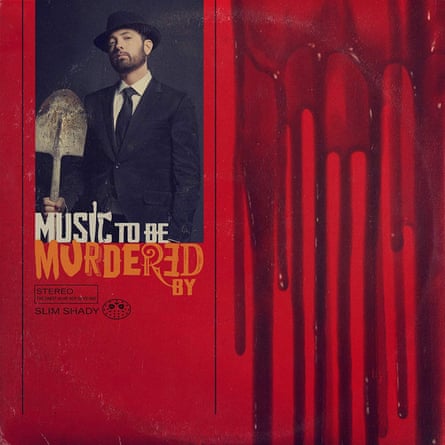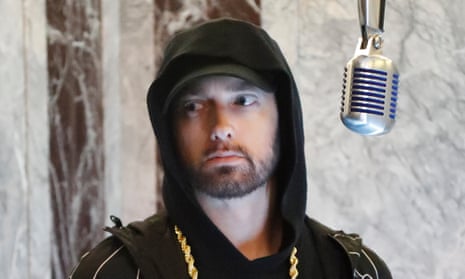Another surprise album drop finds the rapper on stylish form, even as he scatters scorn wide – at young rappers, #MeToo sensibilities – and identifies with deadly outsiders
The last time we encountered Marshall Mathers III – on 2018’s Kamikaze, an album that arrived, like its successor, entirely without warning – he seemed to be in the process of repositioning himself. Hip-hop’s former enfant terrible, a man who made a career out of saying things that even his most nihilistic peers would consider beyond the pale, had reinvented himself as rap’s grumpy dad, baffled and horrified at what the genre had become.

He spent most of Kamikaze carrying on like rap’s answer to Bagpuss curmudgeon-in-chief Professor Yaffle, forever rolling his eyes and tutting and telling the mice on the mouse organ that they were doing it all wrong and their face tattoos looked stupid. Listening to a man in his late 40s complaining about the youngsters’ taste in music is seldom terribly edifying, but he gave it his best shot, deploying all the technical skill he once used to make saying the worst things imaginable sound like the most exciting thing in the world on rubbishing Lil Pump and Charlamagne Tha God.
In fact, perhaps he gave it too good a shot: the most immediately striking thing about its follow-up is that it features the sound of Slim Shady apologising, something that would have once seemed no more likely than Eminem releasing an album of earnest acoustic love ballads or being appointed secretary of the interior. But there it is, a mea culpa for “misplacing my anger” and saying “dumb shit” about Tyler, the Creator and Earl Sweatshirt, both of whom he attacked, the former with a homophobic slur, on Kamikaze. “I shoulda just aimed for the fake ones and traitorous punks,” he admits, adding, very Eminem-ishly, that said nameless fakes and traitorous punks are “cunts” who “can get fucked with 800 motherfucking vibrators at once”.

‘What do you find to get mad about when you’re a sober 47-year-old with a net worth of $230m?’ … Eminem. Photograph: Randy Holmes/Walt Disney Television via Getty Images
What do you find to get mad about when you’re a sober 47-year-old with a net worth of $230m?’ … Eminem. Photograph: Randy Holmes/Walt Disney Television via Getty Images
The fact that this comes in the middle of a track called No Regrets indicates the confusion at the heart of Music to Be Murdered By, an album that speaks loudly and regularly about Emimen’s struggle to find his place within today’s hip-hop landscape and adjust to life on the admittedly multi-million-selling sidelines. “Once I was played in rotation at every radio station,” he protests on opener Premonition.
“Instead of us being credited for longevity and being able to keep it up this long at this level, we get told we’ll never be what we were.” What to do? Take on board developments in the genre, slather on the Auto-Tune and offer your benediction to younger artists by way of guest slots? Mock developments in the genre and angrily reassert your bona fides, with the accompanying implicit suggestion that things have gone steadily downhill since your days as middle America’s favourite folk devil?





